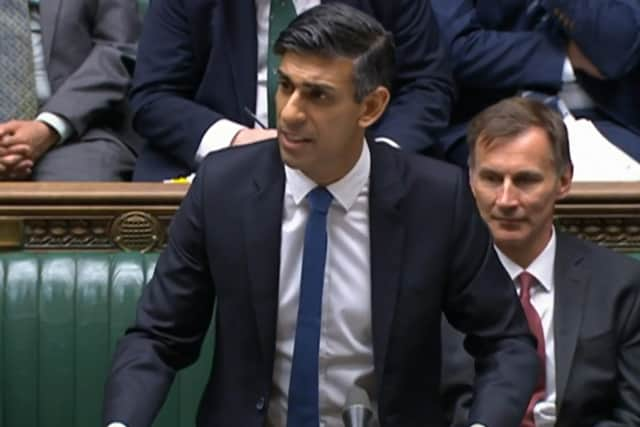PMQs: How did the SNP's Stephen Flynn, Rishi Sunak and Sir Keir Starmer perform as mortgages and Boris Johnson raised
This was never going to be an easy session for the Prime Minister, coming hours after dire economic forecasts, and two days on from his refusal to vote for the sanctions against Boris Johnson.
Sir Keir Starmer led on mortgage rises, blaming the UK Government for the crisis and highlighting the impact on working people through the use of case studies.
Advertisement
Hide AdAdvertisement
Hide AdThe SNP Westminster leader Stephen Flynn then made a damning comparison between Mr Sunak and Boris Johnson, appearing to to suggest the Prime Minister had mislead the Commons.


Rishi Sunak
Mr Sunak seemed angrier and frustrated during a combative PMQs, where he sought to claim the Government had taken action to help households amid more grim inflation news.
He claimed the Labour leader wasn’t “aware of the global macroeconomic situation” and had no plan, before listing numerous ways his party had sought to intervene.
The Prime Minister also pointed to interest rates being at similar levels in the US, in Canada, in Australia and New Zealand, which while valid, will do little to reassure people unable to pay their bills.
His approach was far more to attack Labour’s ideas rather than justify his own, telling MPs “he[Starmer] doesn’t have many policies, but the few that he does have all have the same thing in common, they’re dangerous, inflationary and working people would pay the price.”
Sir Keir Starmer
In a far stronger session than his last appearance, Sir Keir pointed out a Tory MP had warned Britain was facing a “mortgage catastrophe”, asking if Mr Sunak agreed.
The question laid the blame on the Conservatives, and was a trap, forcing the Prime Minister to either agree, or downplay it, looking weak either way.
There were also targeted questions about the impact of inflation rates being expected to rise again, with a dig at Mr Sunak dodging the vote on the privileges committee report.
Advertisement
Hide AdAdvertisement
Hide AdHe said: “I realise the Prime Minister spent all week saying he doesn’t want to influence anyone or anything. He is certainly keeping to that with his answer.
“Whilst his Government is consumed in law-breaking, chaos and division, working people are paying the price.”
Stephen Flynn
The SNP’s Westminster leader suggested the Prime Minister had taken his “honesty lessons from Boris Johnson”, following a series of false predictions over the economy.
He told the Commons: “In February, the Prime Minister told this here House that borrowing costs are back to where they should be, in March he boasted we are on track to halve inflation by the end of the year, and in May he then said economic optimism is increasing.
“Given the dire economic reality of today, is it not now clear that he has taken his honesty lessons from Boris Johnson?”
His comments played into the SNP narrative that the Tories are not in touch with reality, though did land him slightly in trouble with the Commons Speaker.
Sir Lindsay Hoyle warned Mr Flynn to be a “little bit more cautious” and not imply Mr Sunak was misleading MPs.
Comments
Want to join the conversation? Please or to comment on this article.
